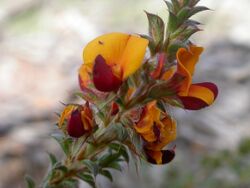Biology:Pultenaea procumbens
| Heathy bush-pea | |
|---|---|

| |
| On Black Mountain in the A.C.T. | |
| Scientific classification | |
| Kingdom: | Plantae |
| Clade: | Tracheophytes |
| Clade: | Angiosperms |
| Clade: | Eudicots |
| Clade: | Rosids |
| Order: | Fabales |
| Family: | Fabaceae |
| Subfamily: | Faboideae |
| Genus: | Pultenaea |
| Species: | P. procumbens
|
| Binomial name | |
| Pultenaea procumbens A.Cunn.[1]
| |
| Synonyms[1] | |
|
List
| |
Pultenaea procumbens, commonly known as heathy bush-pea,[2] is a species of flowering plant in the family Fabaceae and is endemic to south-eastern continental Australia. It is a low-lying or spreading shrub with lance-shaped or rhombic leaves and yellow, orange and red flowers.
Description
Pultenaea procumbens is a low-lying or spreading shrub that typically grows to a height of less than 1 m (3 ft 3 in) and has hairy young stems. The leaves are arranged alternately, lance-shaped or rhombic, 4–10 mm (0.16–0.39 in) long, 1–4 mm (0.039–0.157 in) wide with tapering, lance-shaped stipules 3–4 mm (0.12–0.16 in) long at the base. The edges of the leaves curve strongly downwards and there is a sharp point on the tip. The flowers are arranged in dense, leafy clusters of more than three on the ends of branches and are 7–9 mm (0.28–0.35 in) long, each flower on a pedicel 1.5–2.0 mm (0.059–0.079 in) long. The sepals are 5–7 mm (0.20–0.28 in) long, joined at the base, and there are lance-shaped bracteoles 4–5 mm (0.16–0.20 in) long attached to the sepal tube. The standard petal is yellow to red and 7–8 mm (0.28–0.31 in) wide, the wings are yellow to orange and the keel is red. Flowering mainly occurs from October to November and the fruit is an egg-shaped pod about 5 mm (0.20 in) long.[2][3][4]
Taxonomy
Pultenaea procumbens was first formally described in 1825 by Allan Cunningham in Barron Field's Geographical Memoirs on New South Wales.[5][6] The specific epithet (procumbens) means "procumbent".[7]
Distribution and habitat
Heathy bush-pea grows in forest and heath and is found in New South Wales south from the Nandewar Range through the tablelands and South West Slopes of New South Wales and the Australian Capital Territory to northern and eastern Victoria where it occurs in scattered locations, often on rocky hillsides.[2][3][4]
References
- ↑ 1.0 1.1 "Pultenaea procumbens". Australian Plant Census. https://biodiversity.org.au/nsl/services/apc-format/display/61517.
- ↑ 2.0 2.1 2.2 Corrick, Margaret G.. "Pultenaea procumbens". Royal Botanic Gardens Victoria. https://vicflora.rbg.vic.gov.au/flora/taxon/2f1a2782-8ed5-4a65-8d72-6e6485951363.
- ↑ 3.0 3.1 "Pultenaea procumbens". Royal Botanic Garden Sydney. https://plantnet.rbgsyd.nsw.gov.au/cgi-bin/NSWfl.pl?page=nswfl&lvl=sp&name=Pultenaea~procumbens.
- ↑ 4.0 4.1 Wood, Betty. "Pultenaea procumbens". Lucid Keys. https://apps.lucidcentral.org/plants_se_nsw/text/entities/pultenaea_procumbens.htm.
- ↑ "Pultenaea procumbens". APNI. https://id.biodiversity.org.au/instance/apni/61517.
- ↑ Cunningham, Allan (1825). Barron Field. ed. Geographical Memoirs on New South Wales. London: John Murray. p. 347. https://archive.org/details/geographicalmem00fielgoog/page/n382/mode/2up. Retrieved 14 August 2021.
- ↑ Sharr, Francis Aubi; George, Alex (2019). Western Australian Plant Names and Their Meanings (3rd ed.). Kardinya, WA: Four Gables Press. p. 283. ISBN 9780958034180.
Wikidata ☰ Q15525842 entry
 |

